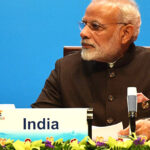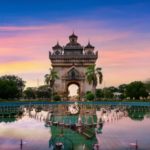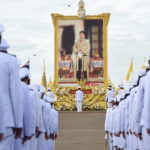
In Thailand’s turbulent politics, old political taboos are being shattered and the once off-limits monarchy is being subject to public criticism. Youth-led protesters are targeting 10 specific areas of government and monarchical reforms, demanding the removal of Thai Prime Minister Prayut Chan-o-cha, but curbs on King Maha Vajiralongkorn’s unchecked power. With institutional reforms to the monarchy now the talk of the country, questions should naturally surface about where power lies. What would a diminished monarchy mean for Thailand’s military?
These questions are critical for protesters as they formulate potential negotiations – if possible – with authorities. For some observers, it is like the proverbial “chicken or the egg” question, with both options symbiotically linked together. Inseparable.
In the beginning, the relationship between the military and the monarchy was indeed symbiotic. They needed each other to guarantee legitimacy for both. During the era of Field Marshal Phibun Songkhram, the Thai monarchy was relatively weak, but a young Bhumibol Adulyadej put his trust in a rival general, Gen. Sarit Thanarat, who seized power in a 1957 coup. Under the tutelage of Sarit, the military and the monarchy built a formidable alliance, managing to keep the progression of Thai democracy manageable and respect for monarchical customs and traditions high.

Sarit supported Bhumibol’s royal projects and boosted the image of the monarchy. The military government began increasing its use of lèse-majesté to mute criticism. While Sarit’s alcoholism ended his short tenure in power, it was long enough to secure Bhumibol’s legacy and legitimacy. The turbulent 1960s and 1970s provided a perfect backdrop, as Communism peered in Thailand’s direction and popular uprisings in 1973 and 1976 provided the monarchy opportunity to become the sole arbiter of political crises.
The symbiosis of Thailand’s military-monarchy alliance has been driven by fear and anxiety – not the sort of irrational fears that lead domestic actors to make erroneous decisions, but the more calculating variety, based on cold, rational self interest. When Thaksin Shinwatra was able to gather a coalition of urban and rural voters that began to chip away at their interests, the military intervened in 2006.
Even with Thaksin out of power, the same coalition was able to overcome any political deficits at the polls. For the 2014 coup, it was the combination of Thaksin-induced anxiety and rational fears over Bhumibol’s declining health that prompted the military to make the latest extra-constitutional intervention. The coup against the caretaker government of Yingluck Shinawatra protected the interests of both the monarchy and the military.
The transition from Bhumibol to Vajiralongkorn has surprised royal watchers. Some early on, thought that the new monarch would be weak, but that calculus proved incorrect. Rather than rule through proxy, like his father, he has chosen to rule directly, and with expanded authority. This is where the question of symbiosis becomes slightly hazy. In many ways the military has worked to ensure that Vajiralongkorn’s political and strategic pursuits became reality. Under the military junta, repressive rule – evidenced by restricted civil liberties, censorship of free speech and a ban on political activity – has been furthered. At the same time, Thailand’s generals have gained elevated status by undermining quasi-democratic institutions, opposition political parties, and weakening majoritarian democracy.
Prayut, from the outset, has aimed to consolidate political power in the hands of the military and embed it within the confines of Thai institutions, often to the disadvantage of civil society and political parties. For example, the 2017 Constitution has weakened the power of political parties in the National Assembly, by creating a system consisting of an elected House of 500 representatives and a handpicked Senate, of which many are dominated by military officials or are the close personal friends of Deputy Prime Minister Prawit Wongsuwan.
The now-defunct National Council for Peace and Order (NCPO) reserved six seats in the Senate for the security forces. The appointed Senate was said to enable the NCPO to carry out a twenty-year reform plan and prevent military coup attempts. The 2017 Constitution also gave significantly more power to an unelected group of military elites, namely from the armed forces, which doesn’t necessarily prevent coups d’état, but enables the military to seize political power without actually having to resort to one.
However, the military has failed to prevent the transition of political power within the military that was created by the untimely death of King Bhumibol Adulyadej. Both the military and the monarchy, through factions, have been awkwardly vying for political positions. Usually, these political changes are overt and happen under the watchful eye of the media and the Thai public in the form of annual changes in the military hierarchy. This factionalism has pitted Vaijralongkorn’s King’s Guard against the Queen’s Guard, which boasts both Prayut and Prawit. As is the custom of past Thai kings, Vajiralongkorn has placed emphasis on populating the ranks of the military from his own faction, which look to maintain control over the military for the foreseeable future.
One critical element is the clear fact that their fates are tied together. The military needs the monarchy for legitimacy and Vajiralongkorn needs the military to bring stability to his reign. To mould the military in his own image, the king departed with proxies in the mould of Prem Tinsulanonda and built relationships with newer generations of Thai military brass that share allegiances to the monarchy.
Vajiralongkorn’s first selection was that of the ultra-nationalist Gen. Apirat Kongsompong, who has been outspoken in criticising opposition political figures, academics and protesters as threats to national security. In replacing Apirat, the former assistant army chief, General Narongphan Jitkaewthae, had come under the eye of the king. Both belonged to the King’s Guard, and Narongphan is associated with the Wong Thewan military faction and is a member of Class 22 of the Armed Forces Academies Preparatory School, the premier school of the Royal Thai Armed Forces Headquarters. Vajiralongkorn has also eyed Gen. Songwit Noonpakdee, the son of the late former Army chief General Isarapong Noonpakdee, who played a pivotal role in the 1991 coup as a potential successor. Loyalty to the King’s Guard faction runs deep with Vajiralongkorn, as he served in counterinsurgency operations under it in the 1970s.
These transitions have become a public spectacle and Vajiralongkorn has been swift to wrest control of the military while consolidating political power for himself. Recently, the monarch moved billions of assets that were previously under the control of the direction of the Crown Property Bureau, as well as holding large positions in Thai corporate conglomerates. With Narongphan holding the top spot until 2023, it allows further concentration of power in the direction of Vajiralongkorn.
Of course, losing out in the larger chess match is Prayut, who preferred Gen. Natthapon Nakpanich for Army chief, and of whom was appointed to a government committee to combat Covid-19. Vajiralongkorn has further reshuffled troops under the command of his Royal Guard 904, as well as placing the 11th Infantry Regiment and the 1st Infantry Regiment under the control of the Palace. The move was granted under Article 172 of the Constitution which allows for the issuance of a royal decree in an emergency that would threaten the monarchy or national security.
While the King is the commander of all of Thailand’s armed forces, the move bypassed the normal chain of command. The former dominance of the Queen’s Guard, which began under Prawit appears to be at an end. The king, to borrow a phrase from Paul Chambers, has further “monarchised” the military. This extends to the Privy Council, which has been reshuffled since 2016 and the death of Prem.
If the military was not as attached to the monarchy, Thailand’s landscape might look dramatically different. However Prayut’s fortunes, like those who have lost their shot at top-level positions to those perceived to be most loyal to the king, are tied to Vajiralongkorn as well.
As junta leader, he bent the new Constitution to the will of the monarchy, allowing the king to reign from his estate in Germany without the need for a regent. In an awkward and somewhat controversial move, Prayut and his line ministers swore an allegiance to the king, but not to the new constitution. And now, with the military firmly under the control of the king, Prayut is virtually powerless.
His ouster will likely be the result of Vajiralongkorn’s displeasure than any sort of “compromise”.






